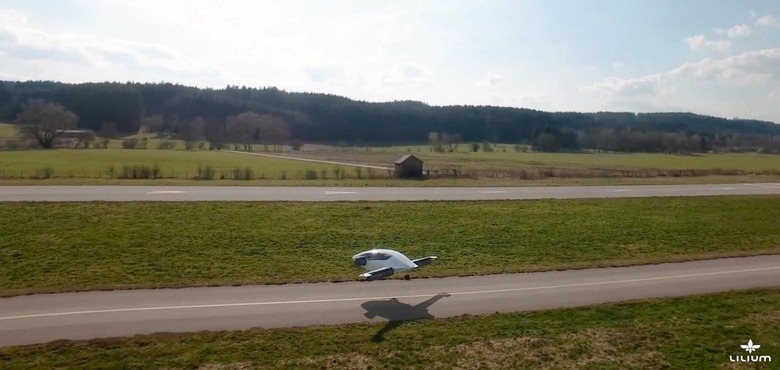You Have To Watch Lilium's Electric VTOL Personal Jet Ace Its First Flight
The promise of personal flying cars has always worked better in science fiction than real life, but Lilium is aiming to change that with its electric Jet. The vertical take-off and landing (VTOL) craft was originally intended as the flying alternative to a two-seater sports car, able to launch straight up without the need of a runway, but then transition into jet-mode once airborne. Now, there's the promise of a five-seater too.
There are some very good reasons why you should be interested in VTOL. Like with a helicopter, VTOL aircraft don't require extended tracts of flat ground in order to take off and land. However, they're also capable of faster speeds than a helicopter when in jet-mode.
It's not a new concept, but Lilium's spin is on making the whole thing entirely green. No emissions from jet fuel or other engines onboard, just a promised 186 mile range and a top speed of 186 mph. In contrast, Bell Helicopter's new 505 Jet Ranger X, a five-seater deliveries of which began last month, has a maximum speed of 144 mph, though range is longer at 400 miles.
The Lilium Jet's advantage, the startup says, is that its electric powertrain is a lot more city-friendly than the Bell. For a start it's much quieter: less noise than a motorbike, Lilium claims. That could pay dividends if the company's plans to position the 5-seat version as a form of on-demand city transportation works out, not to mention the possibility of autonomous flight.
For the moment, though, we're still fairly far from that point. This first successful test of the two-seat prototype from the German company shows that its
combination of 36 jet engines can, indeed, switch from vertical takeoff to horizontal flight. Spread across a set of broad wings, twelve adjustable flaps redirect the flow of air according to required direction.

It's not the only company working on commercializing VTOL technology for personal transportation, mind. Uber is known to be exploring the possibility for Uber Elevate; earlier this year, the company poached NASA's flying car expert to work on a network of building-hopping, computer-controlled electric flying cars. Electricity-obsessed Elon Musk was talking about VTOL last year too, teasing that he was "quite tempted to do something about it."
DARPA is also working on the technology, not to mention a number of other private ventures. The key will be pricing, availability, and what degree of expertise or compromise is required for running a service based on electric VTOL craft. For the moment, the skies above cities are likely to be fairly quiet still.
MORE Lilium
